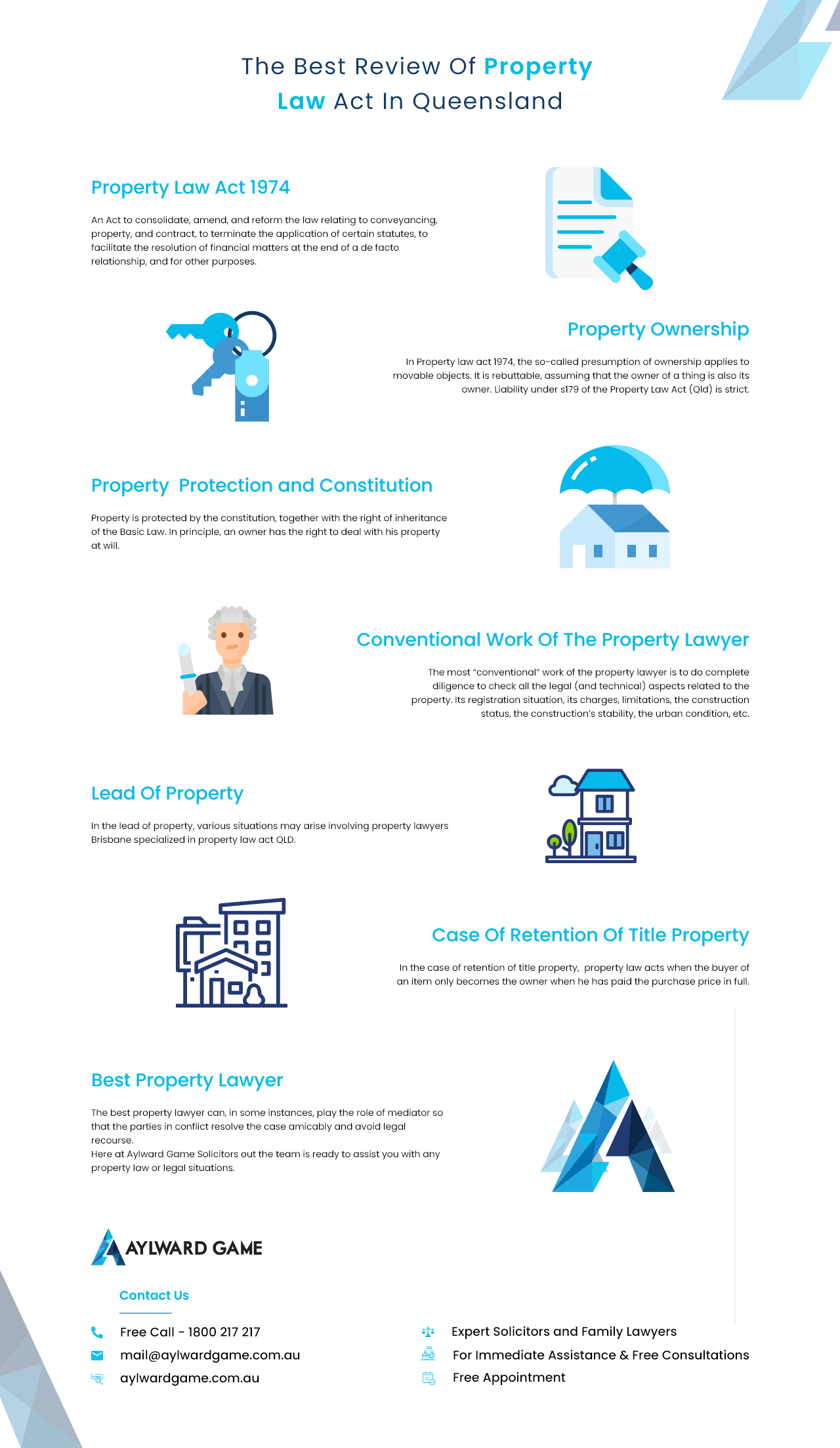Property defines a legal relationship between a sure thing and a person, the owner. In contrast, possession or owner means the actual property control, who can deal directly with it. For example, a resident is regularly the rental property owner while the landlord remains the owner. In the Property law act 1974, the so-called presumption of ownership applies to movable objects. It is rebuttable, assuming that the owner of a thing is also its owner. Liability under s179 of the Property Law Act (Qld) is strict.
Property is protected by the constitution, together with the right of inheritance of the Basic Law. In principle, an owner has the right to deal with his property at will. However, the content and limitations of property are regulated in numerous laws. For example, a property owner cannot develop or convert his property at will. Instead, he must observe public building law with planning law and building regulations or, for example, monument protection. In animal law, the owner of an animal must have rules on animal welfare and the animal welfare law note. The owner must also respect the resident’s right of ownership of the rented apartment and so, bound by a rental agreement, cannot exercise his right of ownership without restrictions.
Property ownership can be owned by one owner alone or by several people jointly as joint ownership. The so-called collective right applies to joint ownership. There are also special features when it comes to homeownership. In an apartment owners association, there is ownership of the individual apartments according to a division plan. Also, there are regularly unique ownership relationships, such as personal property or joint property.
Property ownership is transferred to a new owner, for example, after a purchase or a gift. Ownership does not pass with the conclusion of a contract, such as a sales contract. The requirement for the so-called transfer of ownership is usually the agreement on the transfer of ownership between the old and the new owner and the handover of the thing. When buying land or a house, instead of handing over the property, it is entered in the land register. After the death of a person, inheritance law determines who, as the heir, becomes the new owner of the former property of the deceased, the so-called property.
Negotiating property contracts does not always go through the hands of a property lawyer. This work is usually carried out by property managers – from the point of view of the seller or lessor. But in large-scale operations, for builders or developers, it is or should be the norm. On the buyer or tenant side, this rarely happens. Individuals usually review their property contracts themselves. However, the legal profession has to be there if problems arise that are also considered severe. We talk about the claim about constructive defects or evictions. In these cases, the figure of the Queensland property lawyer can be crucial for a good outcome.
This branch of property law is aimed at the solemnity of operations. Those affected must know precisely the legal importance of a specific property agreement. One of the aspects that give meaning to the property law act is advertising: the Property Registry if we refer to the property’s purchase. In short, a property lawyer specializing in property law act must offer the best advice on registry issues.
The most “conventional” work of the property lawyer is to do complete diligence to check all the legal (and technical) aspects related to the property. Its registration situation, its charges, limitations, the construction status, the construction’s stability, the urban condition, etc. When the sale of a property is going to be carried out, the property lawyer must conduct his clients’ actions so that the acquisition is carried out with total legal certainty. However, in this sense, we can find situations that try to violate the law, either due to ignorance or to commit a crime. The role of the property lawyer must be a guide at all times so as not to violate the law.
Suppose you want to claim construction defects that violate the Technical Building Code. When this happens, it is usually problems that affect the habitability, security, or functionality of the home or premises. Many property lawyers will have lived, in these circumstances, and after communicating the complaint to those responsible.
In the lead of property, various situations may arise involving property lawyers Brisbane specialized in property law act QLD. Let’s look at a possible problem: income claims and other breaches derived from the lease. Or, a more particular case: when a home has several owners, some wanting to rent it and others not. It is not usually known that the lease is valid if you sign it, even if you are one of the co-owners. Even if it is not known that he is acting on behalf of the community, likewise, recalling the property law act here, any of the property owners can urge an eviction or terminate the lease.
And conclude this article, where we review the property lawyer’s work, we cannot forget property leasing. Within this property operation format, let’s stop at the curiosity of the capital gain in this kind of transaction. It should be remembered that the General Directorate of Taxes allows the buyer to claim if the bank affects the payment on him. However, the property leasing deed indicates that it will be the client who must assume this tax payment. These and other everyday matters of a real estate lawyer demonstrate the differential key that our work can suppose.
In the case of retention of title property, property law acts when the buyer of an item only becomes the owner when he has paid the purchase price in full. Until then, he only has a so-called expectant right. As a result, the seller must transfer ownership of the purchased item after the purchase price has been paid in full. The expectancy, as a so-called “identical minus,” is less than the property itself, but at least means that the seller can no longer withdraw from the contract without reason.
There are also various particular forms of retention of title. Extended reservation of title, vast reservation of title, or forwarded reservation of title often occur. It is regularly a matter of the buyer, for example, a small commercial trader, allowing to resell or transfer ownership of the goods purchased from his supplier under retention of title, even though he is not yet the owner. From the purchase prices paid to him, the dealer then regularly pays his supplier’s statements.
When selling or buying property, litigation, and litigation can arise. If necessary, it is recommended to use the services of a property lawyer. This property lawyers Gold Coast may be called upon for advice or as a defense lawyer in the event of legal recourse. The defendant may choose it. The fees of this lawyer are fixed with the client and depend on the difficulty of the case. They are determined in a lawyer’s fee agreement signed by both parties.
As its name suggests, the property lawyer is a specialist in the property law act. This lawyer must have a perfect mastery of the Construction and Housing Code. It is possible to find this lawyer online or with justice institutions. Like lawyers in foreigners’ law, lawyers in family law, or lawyers in labor law, this professional is established in different Brisbane areas.
The lawyer specializing in the property must master the elements of private and public property law and the property law act, and the Town Planning Code. Moreover, property law is a branch of law that deals with the sector relating to the property.
The property lawyer is a professional who settles cases related to property. His intervention is essential when his client’s rights are threatened or faced with a tricky situation.
A property lawyer is often used in the event of a property dispute, particularly in the division of an inheritance. The field of intervention of this lawyer is not limited to conflict resolution but can extend to various areas related to property law.
The best property lawyer can, in some instances, play the role of mediator so that the parties in conflict resolve the case amicably and avoid legal recourse.
Here at Aylward Game Solicitors out the team is ready to assist you with any property law or legal situations on 1800 217 217.
Frequently Ask Questions:
What is property law?
The lawyer specializing in the property must master the elements of private and public real estate law and the Civil Code and the Town Planning Code.
What is a property lawyer?
The property lawyer is a professional who settles cases related to property. His intervention is essential when his client’s rights are threatened or when he is faced with a complicated situation. As its name suggests, the property lawyer is a specialist in property law. This lawyer must have a perfect mastery of the Construction and Housing Code.
When to call a property lawyer?
It is possible and even recommended to use a property lawyer in several situations relating to the use of a property.
What are the missions of a lawyer in property law?
The property lawyer has several missions: a role of assistance and advice, a role in drafting acts, and a role of representing his client’s interests before the judge in the event of legal proceedings.
What are the average fees for a property lawyer?
No regulation or scale fixing the number of a lawyer’s fees in property law.
Article Source: Property Law Act Qld








